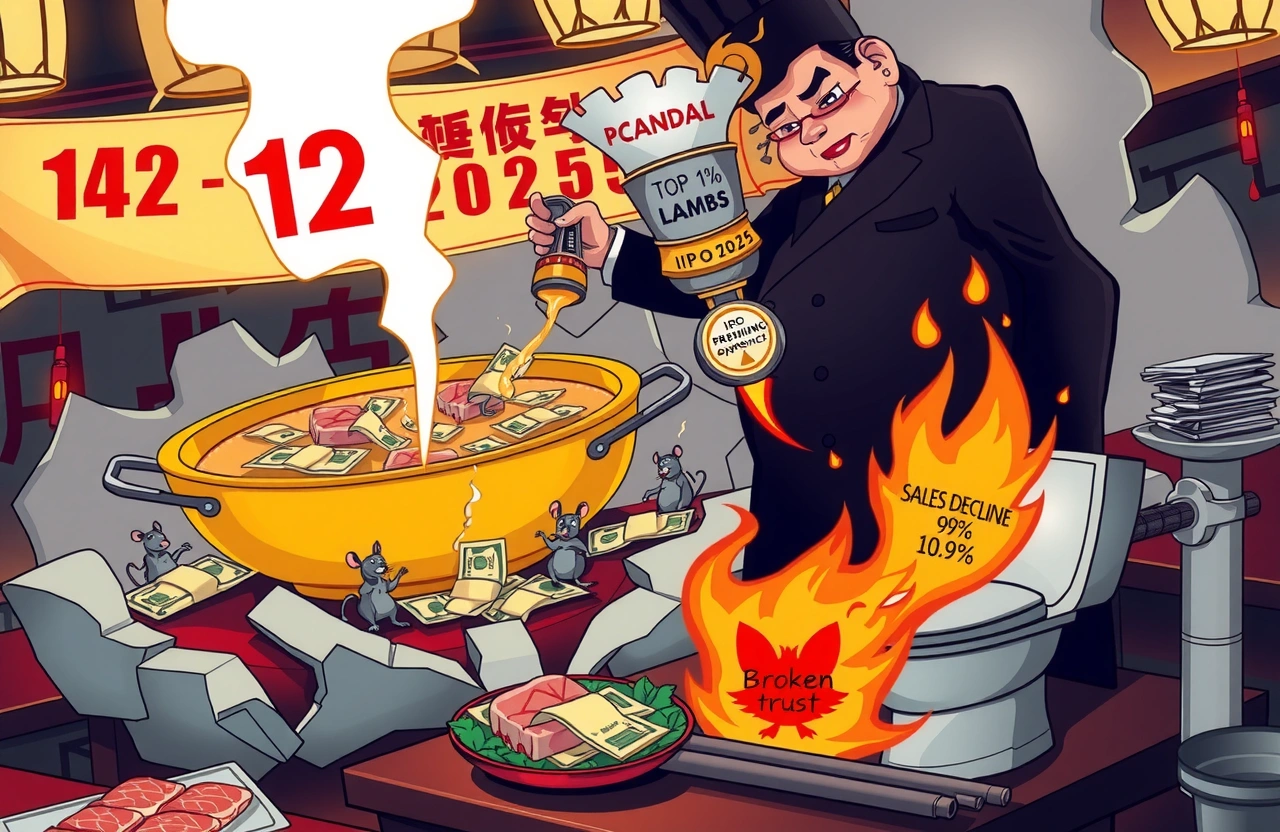The High-Stakes Hotpot IPO
Du Zhongbing (杜中兵), the Hebei-born founder of premium hotpot chain Banu, is betting big with a Hong Kong IPO despite mounting challenges. With average prices soaring 90% above industry norms at 142 yuan per diner, Banu’s ‘product-first’ positioning targets China’s aspirational middle class. Yet beneath the premium veneer lies a troubling reality: same-store sales plunged 9.9% in 2024 while scandals from ‘gilded potatoes’ to adulterated meat chips away at consumer trust. As Banu Hotpot’s IPO advances, investors must weigh whether this high-priced bet can simmer into sustainable success or boil over into disappointment.
Expansion Masks Operational Weaknesses
Banu’s 67.4% store growth since 2022 paints a deceptively rosy picture. While total revenue climbed to 2.31 billion yuan in 2024, key performance metrics reveal worrying erosion in store-level economics.
Shrinking Store Efficiency
– Average daily customers per location fell 6.5% year-over-year in 2024
– First-tier cities suffered most severely: 17.6% customer decline over two years
– Same-store sales dropped 9.9% annually despite overall revenue growth
The Expansion Trap
New store openings temporarily boost revenue while hiding underlying weaknesses. Mature locations opened before 2022 saw sales dip from 56,500 yuan to 53,900 yuan daily. This ‘growth trap’ threatens long-term viability as Banu Hotpot’s IPO approaches, with expansion costs potentially outweighing diminishing returns from new outlets.
Premium Pricing Under Fire
Banu’s 142 yuan average ticket—40% above Haidilao’s 97.5 yuan—faces mounting consumer skepticism after repeated scandals undermined its quality narrative.
Food Safety Fiascos
The 2023 ‘duck meat lamb’ scandal exposed systemic issues when influencer ‘Monkey Big Wrist’ revealed Banu’s sub-brand Super Island sold mislabeled products. Despite claims of operational independence, Beijing authorities fined the chain 426,000 yuan for violations. Earlier that year, the ‘gilded potato’ debacle saw 18-yuan potato portions (later reduced to 9 yuan) test below advertised selenium levels, forcing product recalls.
Tone-Deaf Leadership
Founder Du Zhongbing (杜中兵) compounded crises with divisive remarks claiming ‘hotpot isn’t for people earning 5,000 yuan monthly’ and dismissing affordability concerns. This contradicted Banu’s ‘boat tracker spirit’ proletarian branding, alienating the core market its IPO prospectus targets.
Financial Realities vs. IPO Aspirations
Banu Hotpot’s IPO documents reveal troubling gaps between premium positioning and actual performance. While adjusted net profit reached 196 million yuan in 2024, profitability lags behind competitors.
Profitability Disparity
– 2024 net margin: 8.5% vs. Haidilao’s 11.0%
– Revenue per store dropped 11.9% year-over-year
– First-tier city sales plummeted 25.5% over two years
Labor Cost Shell Game
Despite falling sales volumes, Banu boosted store-level profits by slashing labor costs. Full-time staff grew just 8% while part-time workers surged 140% between 2023-2024—a short-term fix that risks service quality and contradicts Banu’s ‘everything meticulous’ brand promise.
Rebuilding Broken Trust
Banu’s ‘productism’ philosophy faces credibility challenges after repeated scandals. The 2024 ‘too-common vegetables’ campaign—removing cabbage and spinach for being ‘too ordinary’—further cemented perceptions of elitism disconnected from consumer realities.
Trust Deficit
Multiple food safety incidents and misleading claims shattered the premium perception justifying Banu’s prices. When core differentiators like ‘selenium-rich potatoes’ proved exaggerated, the entire value proposition suffered. Rebuilding credibility requires transparent sourcing and consistent quality control—areas where Banu Hotpot’s IPO prospectus shows increased compliance staffing but offers few substantive changes.
Market Positioning Paradox
Banu struggles to reconcile aspirational pricing with mass-market accessibility. As disposable incomes tighten, consumers question whether premium hotpot justifies 142 yuan per person—especially when scandals suggest quality doesn’t match marketing. The chain’s future depends on authentic value demonstration, not just premium posturing.
Path Forward for Premium Dining
Banu Hotpot’s IPO represents a critical inflection point. Success requires addressing core contradictions between premium branding and operational realities. Investors should scrutinize whether expansion plans solve fundamental issues or merely postpone reckoning with declining store economics. For China’s dining sector, Banu’s trajectory offers cautionary lessons about balancing growth with sustainable unit economics. As the Hong Kong listing proceeds, the market will ultimately decide whether this hotpot dream simmers to perfection or boils over.



